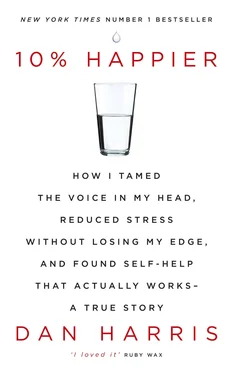As the debate ground on, Deepak made his points while gesticulating and shouting. When others talked, he slumped in his chair, looking annoyed, like he had somewhere better to be, even though he was the one who initiated this whole thing.
When it was over and the audience cleared out and I prepared to take off, I made sure to circle back to Sam and Annaka, who once again raised the subject of meditation. They had a suggestion for me: I should go on a retreat. Recognizing the look of dread on my face, they acknowledged it could be a little tough, but assured me it would be worth it. They knew an amazing teacher, they said. His name: Joseph Goldstein.
It was hard to ignore two brilliant people recommending the same meditation teacher. (Turned out, Sam, too, was old friends with Goldstein, although Sam and Mark had never met.) So when I got home, I promptly read a few books by this purported meditative genius. While the books provided terrific explications of how to employ mindfulness as a way to create space between stimulus and response in everyday life, there was also a lot of talk about reincarnation, psychic powers, and “beings on other planes of existence.” I wondered how Sam handled assertions like this one: “There are those even today who have developed the power of mind to see karmic unfolding through past and future lifetimes.” Charitably, Goldstein did say if you don’t find this stuff credible, it wouldn’t affect your chances for “liberation.”
Still, I had Mark’s and Sam’s advice ringing in my ears like a taunt. My curiosity was piqued; a little bit of pride was on the line. If I was in this meditation thing now, I might as well go the distance. I went online and saw that Goldstein was leading a retreat in California, called simply the “July Insight Meditation Retreat.” Certainly less grandiose than James Ray’s “Spiritual Warrior Retreat.” Less expensive, too: about a thousand bucks for ten days.
When I tried to sign up, though, I found to my wonderment that it wasn’t so easy to get in. There were so many applicants that slots were awarded through a lottery system. I called Goldstein’s people and tried to pull the reporter card. They were unmoved. Now that I couldn’t have it, I wanted it even more.
I emailed Sam Harris and asked if he could hook me up. He told me he’d put in a word, but gave no guarantees. (In the course of our email correspondence, I was surprised to learn that the hard-nosed atheist used emoticons.) Since this was the only retreat Goldstein would be leading anytime soon, I was now in the awkward position of stressing over getting into an event designed to help me manage stress, and that I was sure I would dislike intensely.
Not long thereafter, I got another chance to test my mindfulness skills under duress. Amy Entelis called to tell me that they were giving the Nightline job to Bill Weir. There was still no word on whether I’d gotten GMA , and no date certain for a decision. So I would be in a special kind of purgatory for the foreseeable future.
The timing was interesting, though. The very next day, thanks to Sam, I was headed to California. As he put it in an email, he had “toyed with the laws of karma” and gotten me into the retreat.
It was the longest, most exquisite high of my life, but the hangover came first.
Day One
Here’s what I’m mindful of right now: pervasive dread.
I’m sitting in a café in San Francisco, having what I assume will be my last decent meal before I check in for the Zen Death March. As I eat, I leaf listlessly through the mimeographed information sheets sent by the people at the retreat center. The place is called Spirit Rock, which sounds like a New Age version of “Fraggle Rock,” populated by crystal-wielding Muppets. The writing is abristle with the type of syrupy language that drives me up a wall:
“Retreats offer a sacred space, protected and removed from the world, intended to allow participants to quiet the mind and open the heart.”
The sheets request that we “take whatever room is offered,” whether it’s a single or a double. (This sends unpleasant images dancing through my head of potential roommates who are all gray-haired, ponytailed, beret-wearing, Wavy Gravy look-alikes.) The chefs will “lovingly prepare” lacto-ovo vegetarian food. We will be assigned daily “yogi jobs,” either in housekeeping or the kitchen, or “ringing bells,” whatever that means. There’s a lengthy list of “What Not to Bring,” seemingly written in 1983, which includes beeper watches and “Walkmans.” The retreat will be conducted in “noble silence,” which means no talking to one another and no communication with the outside world, except in case of emergencies.
The whole ten-days-of-no-talking thing is the detail that everyone I told about the retreat keyed in on. To a man (or woman), the people I had the courage to admit how I was spending my vacation asked something to the effect of, “How can you go without talking for that long?” Silence, however, is the part that worries me the least. I don’t imagine there will be many people at the retreat I’ll be dying to chat with. What truly scares me is the pain and boredom of sitting and meditating all day every day for ten straight days. For a guy with a bad back and a chronic inability to sit still, this is definitely a suboptimal holiday.
I call a cab for the hour-long ride to northern Marin County. As we cross the Golden Gate, I feel like a lamb leading itself to slaughter. I get an email from Sam saying he’s “envious” of the experience I’m about to have. His timing is impeccable. It’s an encouraging reminder that, apparently, these retreats can produce remarkable moments. In fact, I recently read a New York Times op-ed piece by Robert Wright, a journalist, polemicist, curmudgeon, and agnostic not known for either credulousness or mystical leanings. Wright wrote that he had “just about the most amazing experience” of his life on retreat, which involved finding “a new kind of happiness,” and included a “moment of bonding with a lizard.”
However, major breakthroughs—known in spiritual circles as “peak experiences”—cannot be guaranteed. What is almost certain, though—and even Sam acknowledged this—is that the first few days will be an ordeal. Classic prapañca : I’m casting forward to day two or three, envisioning myself marooned and miserable.
We roll up to Spirit Rock at around four in the afternoon. As we pull off the main road and onto the campus, I spot a sign that reads YIELD TO THE PRESENT.
Jesus.
The place is beautiful, though, like something out of a French Impressionist painting. We are surrounded by hills covered in pale gold, sun-bleached scrub grass, with clusters of vivid green trees nestled throughout. The center itself is a series of handsome wood structures with Japanese-style roofs, built into the side of a hill.
As I wheel my luggage up to the main office, I catch the first glimpses of my fellow meditators. They are solidly, solidly NPR—card-carrying members of the socks-and-sandals set.
We line up for our room assignments and yogi jobs. (I’m starting to figure out that yogi is just another word for “meditator.”) I’m told I will be a “pot washer.”
Hallelujah: I get a single room, on the second floor of one of the four dorm buildings. The accommodations are spare, but not gross. There’s a single bed next to a window. The walls are white. The carpet is tan. There’s a mirror and a sink. The communal bathroom is down the hall.
At six o’clock, dinner—and my first big shock: the food is excellent. It’s a buffet of smashed-pea dip, just-baked bread, salad with dill dressing, and soup made out of fresh squash.
Читать дальше












